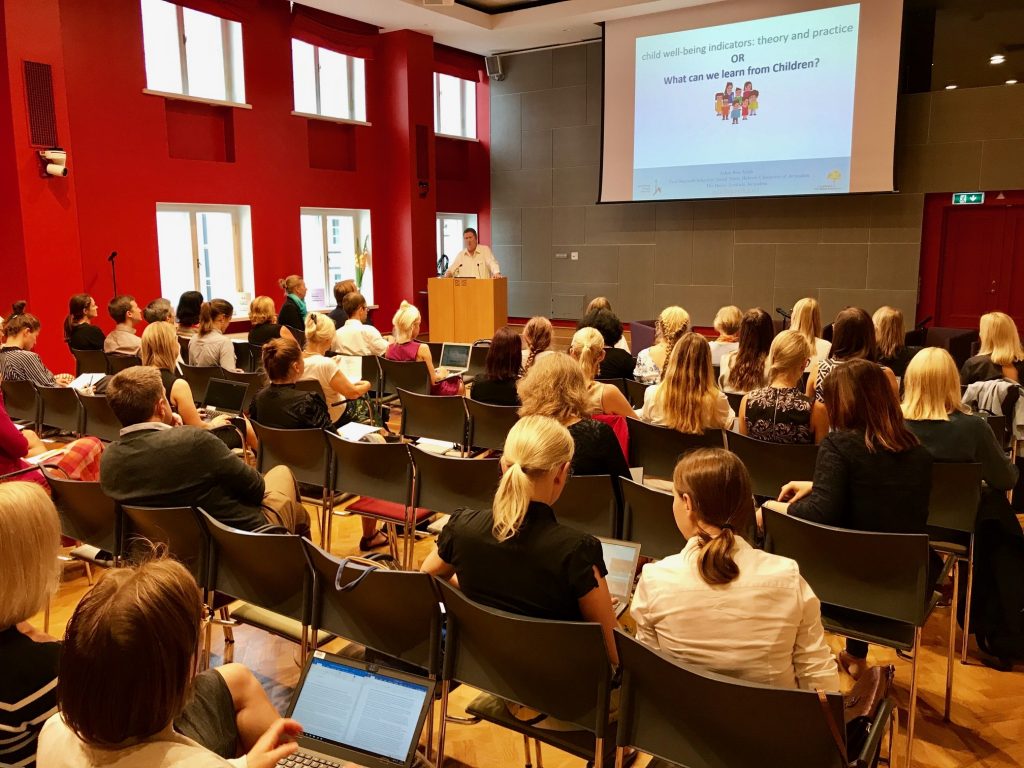Well-being of Estonian children requires more detailed measuring
At the seminar organised by the Foresight Centre and the Office of the Chancellor of Justice, researchers and practitioners working with children discussed the well-being of Estonian children, and focused on the bottlenecks and possibilities of measuring it.

The experts and researchers who spoke at the seminar “Child Well-being Indicators: Current Situation in and Possibilities for Describing the Situation of Children” emphasised that an integral overview of the situation of children and monitoring it helped prevent problems and support the all-round development of children. At the same time, not noticing and not interfering have a high price for the society.
Andra Reinomägi, Adviser at the Office of the Chancellor of Justice, pointed out that children formed around one fifth of the population and, considering the average life expectancy, childhood formed one fifth of life. “It is important that we knew how children in Estonia live. Unfortunately, we have to admit that the assessment of the rights and well-being of children in Estonia is incomplete; relevant indicators are fragmented and the age divisions of regular statistics often do not enable to get an overview of 0–17 years old children as a whole. The obstacles are the structure of data collections and also the absence of data,” Reinomägi said.
Creator of the International Society for Child Indicators (ISCI) web Professor Asher Ben-Arieh of the Hebrew University of Israel, who spoke of child well-being indicators, highlighted a clear message in his report: “Listen to the child!”
Dagmar Kutsar, Associate Professor in Social Policy at the University of Tartu, said that although research of children’s well-being is a new trend in social sciences, the studies conducted in Estonia and international studies had considerably helped understand children. “It is very important that our practitioners working with children and policy shapers were aware of the real situation of children in Estonia and also the results of international research work, because it establishes conditions for early identification of problems, reacting to them and making informed decisions,” Kutsar underlined.
It is also necessary to criticise the published data because of the lack of sufficient child-centred statistics in mainstream statistics. For example, statistics on the number and percentage of households with children is regularly published in Estonia, but there is no child-centred statistics on the number and percentage of children in different types of households, which would give these data a children-based meaning.
The report of Expert of Foresight Centre Mari Rell focused on general measuring of well-being in in the human resources research project. “Up to now, economic success has primarily been emphasised in policy shaping, and economic growth has been the aim. The new treatment, which we also follow in our human resources research path and which many countries already use, is the so-called ‘beyond GDP’ approach, where wider comprehension of the well-being of humans and social development of the country is important,” Rell said.
In the report to the UN Committee on the Rights of the Child on the child rights situation, the Chancellor of Justice pointed out her recommendations to the state:
- Both child-centred (child as an observation unit) and child-based (child as an information source) data should be published in mainstream statistics, bringing out the 0–17 age group in each area;
- To continue collecting data from children themselves, including also the questions relating to economic and social well-being;
- To create a system of indicators reflecting the well-being of children and publish such indicators each year to evaluate ensuring the rights of children;
- To replace the aggregate data on children by individual data in data collection systems, or to improve the data collection systems so that it would be possible to retrieve, and combine and publish data on different age groups of children according to the needs and traditions of the interested party.
At the seminar “Child Well-being Indicators: Current Situation in and Possibilities for Describing the Situation of Children”, organised by the Foresight Centre of the Riigikogu and the Office of the Chancellor of Justice, the situation and possibilities of describing and monitoring child well-being in Estonia were discussed.
Latest news
-
27.06 2025Current low birth rate will lead to up to 1.3 billion euros less tax revenue in the future
In its new short report “The impact of population ageing and low birth rate on long-term state revenue and expenditure”, the Foresight Centre notes that the lower than projected birth rate will reduce government spending on family policy and education, but in the long term, it will mean up to 1.3 billion euros less in tax revenue.

 An independent think tank at the Riigikogu
An independent think tank at the Riigikogu